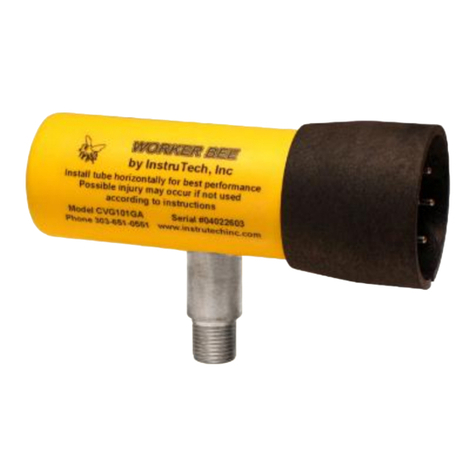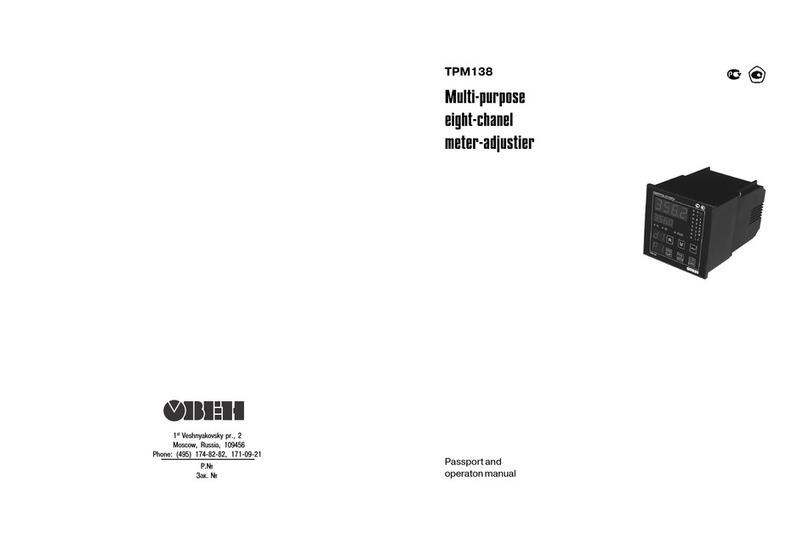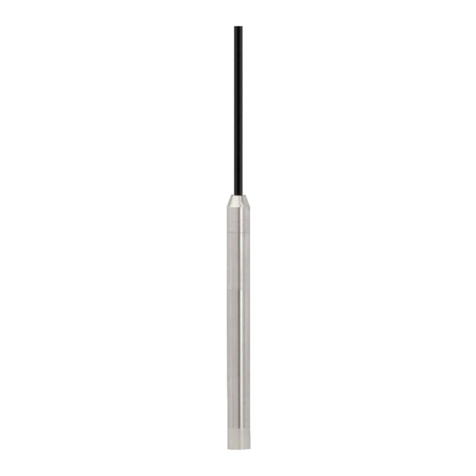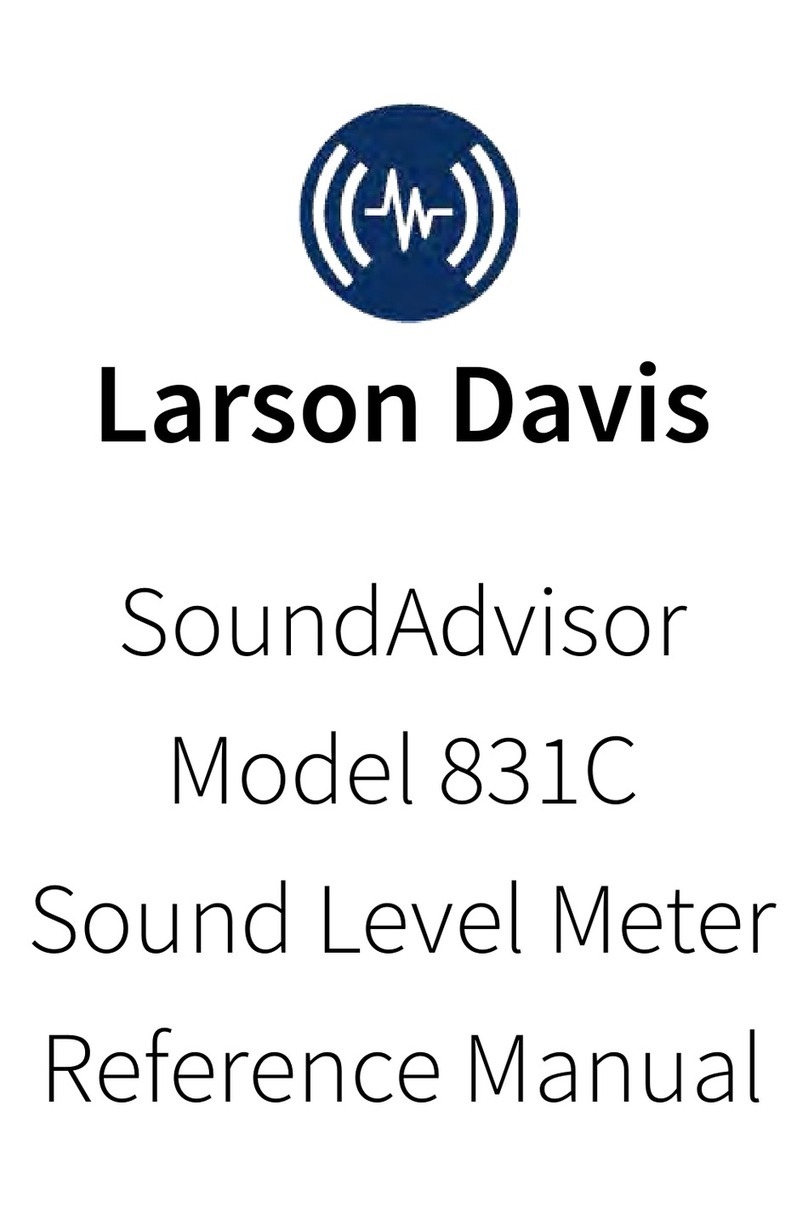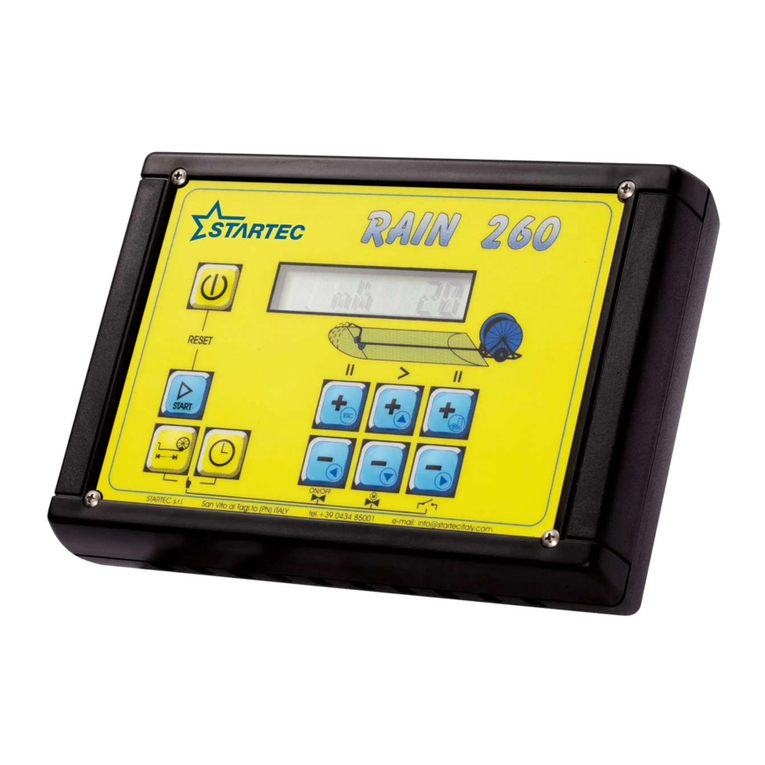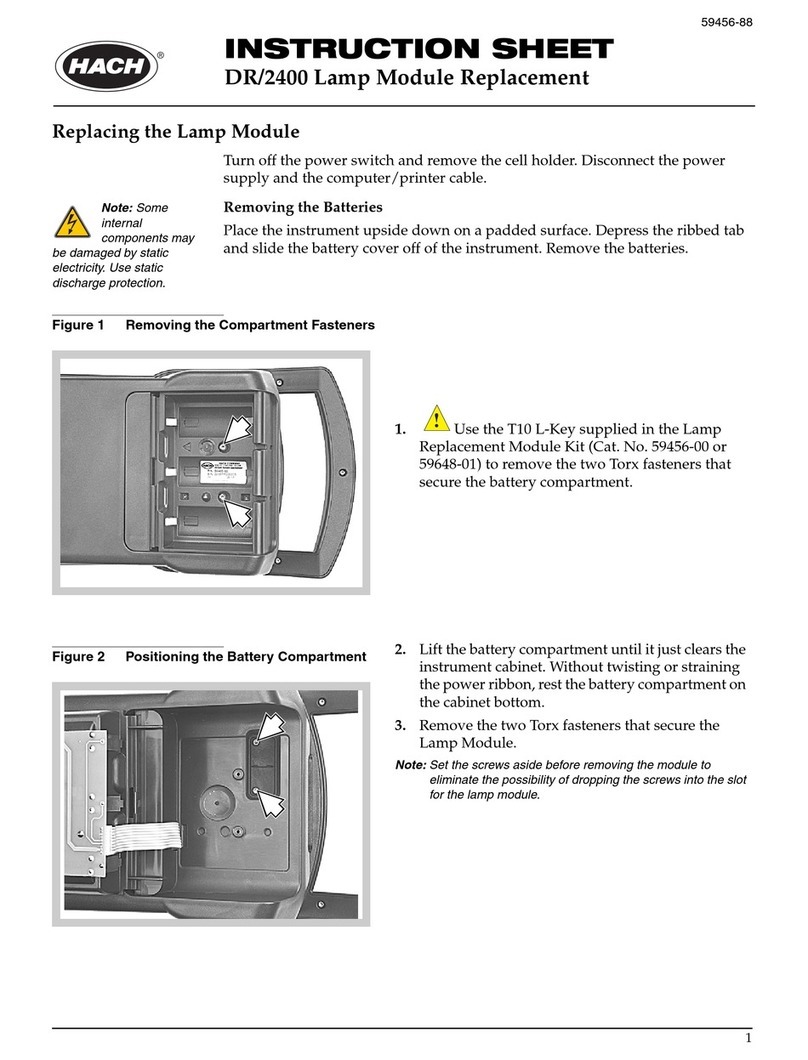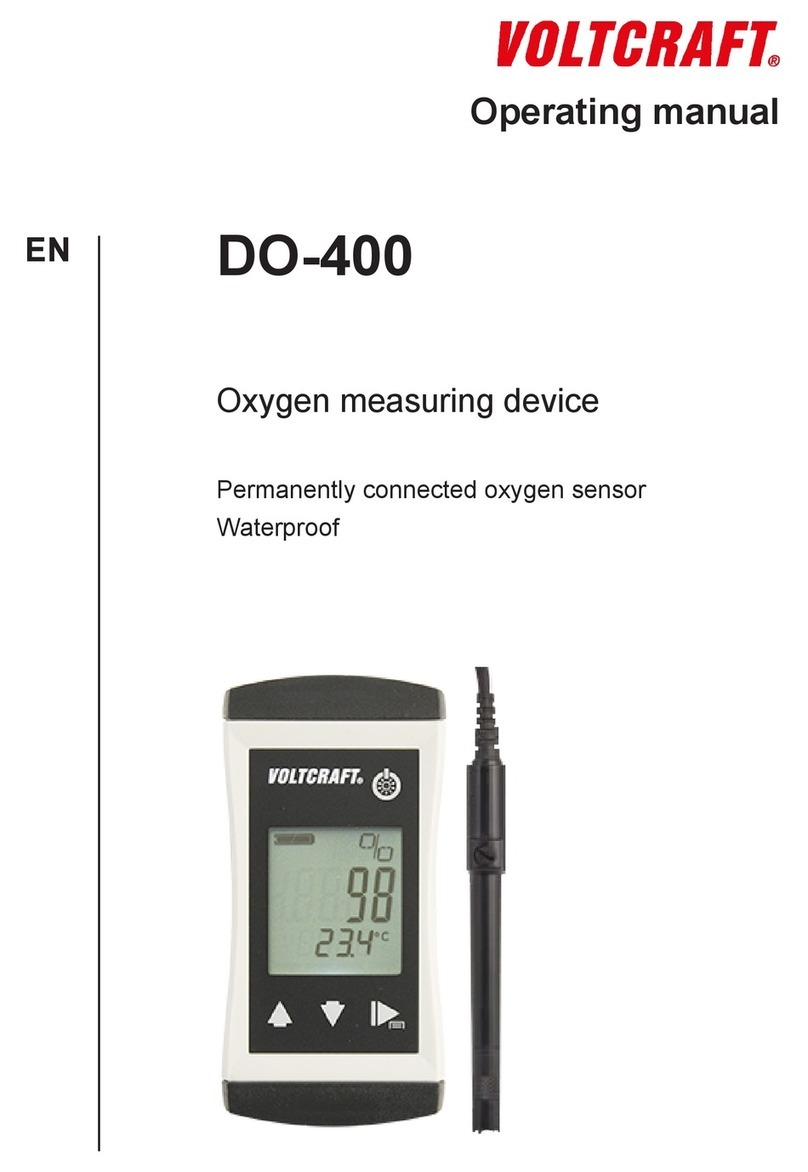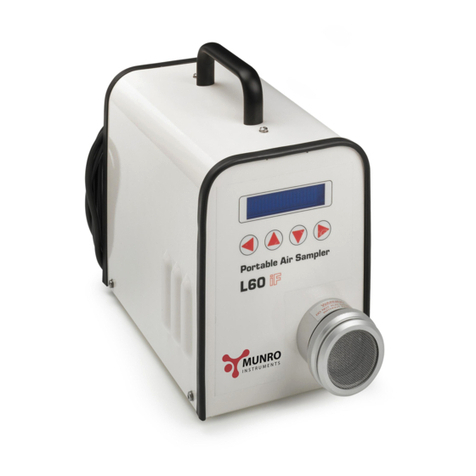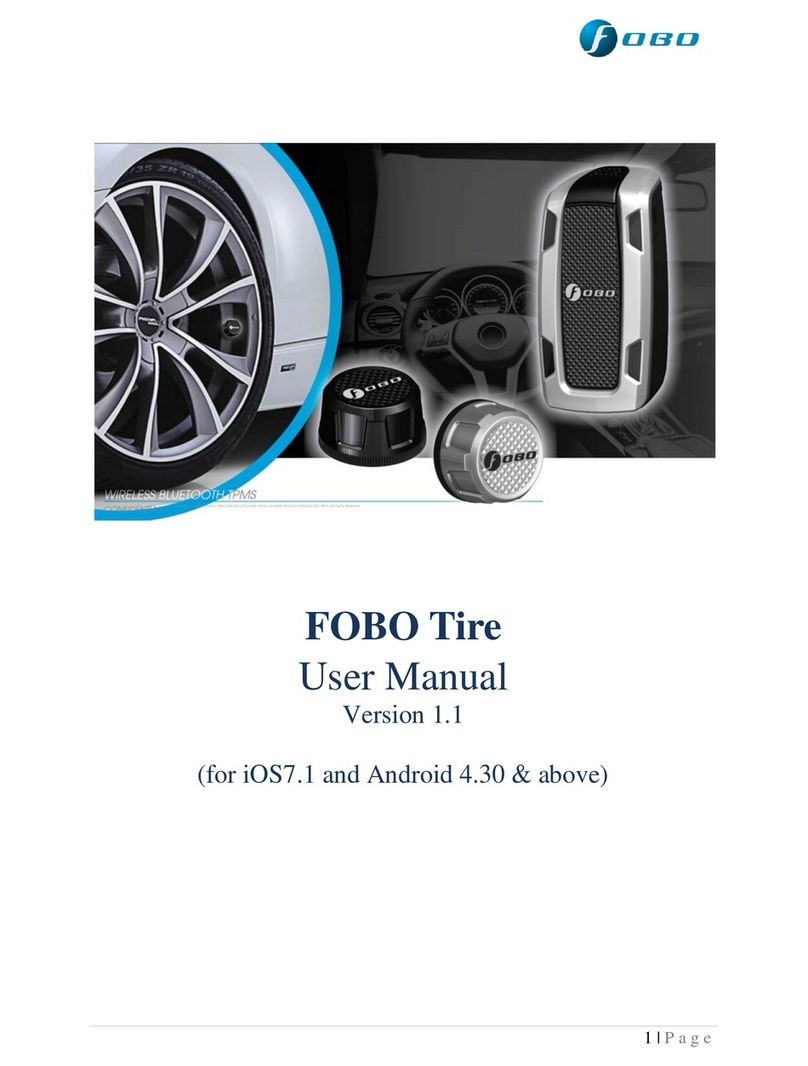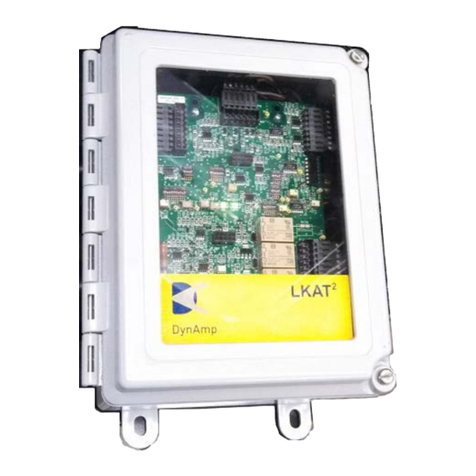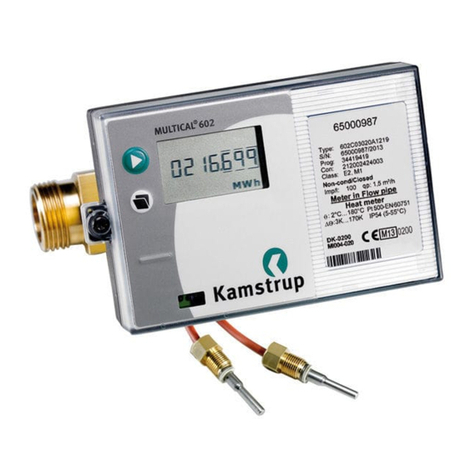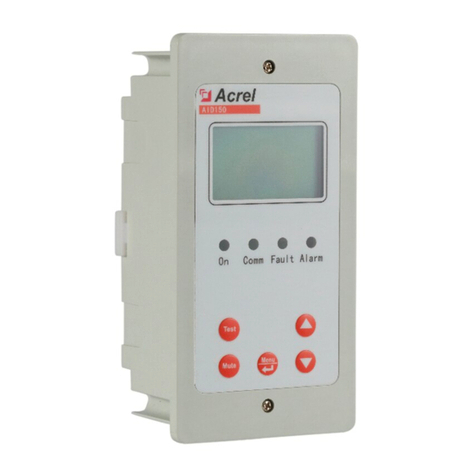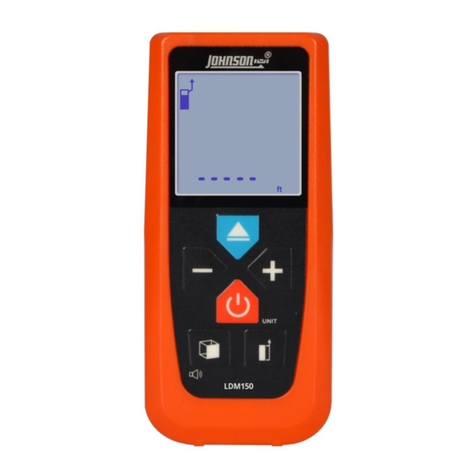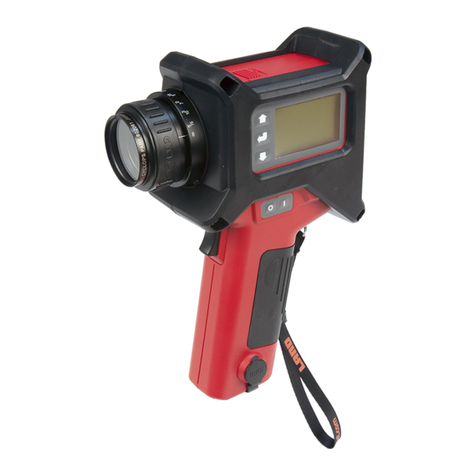SensorLink Varcorder 910 Series User manual

SensorLink®Corporation
Operators Manual
Varcorder
Amp & Power Factor Recorder

Unit and Accessory Part Numbers
Varcorder
Model 910
*Qty (1) sold in 6-910-1 Kit
*Qty (3) sold in 6-910-3 Kit
Universal Switch Stick Adapter
Model 7-053
*Qty (1) sold in 6-910-1 Kit
*Qty (1) sold in 6-910-3 Kit
Universal Switch Stick Receiver
Model 7-054
*Qty (1) sold in 6-910-1 Kit
*Qty (3) sold in 6-910-3 Kit
Carrying Case
Model 659
*Qty (1) sold in 6-910-1 Kit
*Qty (1) sold in 6-910-3 Kit
USB IrDA Dongle
Model 7-021B
*Qty (1) sold in 6-910-1 Kit
*Qty (1) sold in 6-910-3 Kit

Operators Manual
Varcorder
Amp & Power Factor Recorder
Table of Contents Page
Specifications 4
Safety Information 5
Theory of Operation 5
Preventative Maintenance 6
Cleaning 6
Low Temperature Applications 6
Powering the Unit 6
Sample and Log Intervals 6
Battery Replacement and Operation 7
Installing on a Line
Installing on a line with a Shotgun Hot Stick 8
Installing on a line with a Universal Switch Stick Hot Stick 9
Warranty 19
Quality Assurance Back Cover
Softlink Software
System Requirements 10
Installation of Software and USB IrDA 10
Communicating with Recorder 11
Discover Recorder 11
Configure Recorder 12
Entering Nominal Voltage 13
Download Recorder Data 13
Saving Recorder Data 14
Opening Recorder Data 15
Recorder Options 16
Graphing Recorder Data 17
Troubleshooting 18
Available Stock Codes:
910-50HZ 910-60HZ 910 EURO

Page 4
SPECIFICATIONS
Kit Number 6-910-3
Type Recording Varcorder Kit, three phase
Kit Includes 3 ea Varcorder
1 ea IrDA USB Cable
1 ea Universal Hot Stick Adapter
3 ea Universal Hot Stick Receivers
1 ea Soft Carrying Case
Range of Operation
Phase to Phase Voltage 69 kV, 600 V minimum for accurate Power Factor
Current 1 to 2000 A
Resolution
Amps 1 to 99.9 A 0.1 A
Amps 100 to 2000 A 1 A
Power Factor .01
Accuracy
Amps ± 1%, ± 2 Counts
Power Factor ± .01 (from .71 lead to .71 lag)
Frequency, 50 Hz 47 to 53 Hz
Frequency, 60 Hz 57 to 63 Hz
Mechanical
Weight 1.5 lbs, 0.68 kg
Dimensions 9.75 in x 4.75 in x 3 in (24.77 cm x 12.07 cm x 7.62 cm)
Sensor Opening Up to 1.5 in, Up to 3.3 cm
Operating Temperature -22 to +140˚ F, -30 to +60˚ C
Lithium battery required for temperatures below -4°F (-20°C).
Storage Temperature -40 to +158˚ F (-40 to +70˚ C)
Hotstick Mounting Shotgun & Switch Stick Style Hot Stick (Hot sticks not included)
Battery 9 Volt Alkaline or Lithium
Indoor/Outdoor Use
Relative Humidity 90% Non - Condensing
Altitude 9800 ft, 3000 m
Software Requirements Softlink by SensorLink, included in sales kit
Operating System Windows 7, 8, or 10
Data Collection Space 64,000 Log intervals
EC Standards Successfully passed international test standards indicated by CE

Page 5
Safety Information
Read all safety and instruction statements before using the product. Failing to
follow the safety guidelines can cause severe injury or death.
Varcorders are designed for use on live, overhead lines with 0 to 69KV. All
procedures appropriate for the line voltage are to be taken, including proper
work techniques, equipment, and Personal Protection Equipment.
The Varcorder should be deployed and retrieved only by certified personnel
who have been trained for live-line, high voltage work by their organization.
The Varcorder is to be installed and removed from the line with a suitable
shotgun or switch stick style hot stick. The hot stick is considered the sole
voltage isolation device.
The hot stick length must be correct for line voltage per minimum approach
distances stated in published OSHA regulations and/or provided by the utility.
The cover plate, chuck, and entire Varcorder are to be considered at the same
potential. Putting the cover plate, chuck, or other parts of the Varcorder
within the air gap of adjacent phases or ground could cause a phase to phase
or phase to ground fault.
Do not alter the product in any manner.
Theory of Operation
The Varcorder deploys on a line to measure and record True RMS Amps and Power
Factor on overhead lines. The Varcorder uses the same current sensor technology
as the original SensorLink®Ampstik®, which does not use magnetic materials and
has no moving parts. True Power Factor is calculated by measuring the electric field
in comparison with the current reported from the amp sensor. The electric field
waveform characteristics give accurate readings for Power Factor calculation.
Measurements are taken at user defined intervals. In Softlink software the user
selects how often to sample and log the data.
Remove the units from the line to download the data via IrDA. With the optional
Transcorder, data may be downloaded via radio with the unit deployed on the line.
SoftLink software will calculate the VARs after the user applies a nominal phase to
ground voltage constant in Softlink.
For accurate Power Factor, direct connection to the bare conductor is required.

Low Temperature Applications
The Alkaline Battery and the IrDA transceiver are two components that limit the
operation of the Recorder to down to -4F / -20C. By substituting a Lithium long-life
battery the Recorder can collect data down to -40. Because the IrDA transmitter
doesn't perform at these low temperatures, when collecting the data from the
Recorder the temperature needs to be above -4F/ -20C.
Powering the Unit
The Recorder powers on and begins taking recordings when the battery is properly
connected and placed into the battery compartment.
Preventative Maintenance
The Recorder should be visually inspected for cracks in urethane. Do not use if
cracks are present or the unit is damaged. Verify the air vent on the faceplate has
not been covered. The membrane on the inside of the faceplate is designed to allow
the unit to breath properly.
Cleaning
The Recorder should be cleaned by wiping with a silicone hot stick wipe to remove
dirt, sand, and salt that will degrade the urethane housing.
Page 6
Sample and Log Intervals
Sample and Log Interval: The Sample Interval is how often the Recorder reads
the current on the conductor. The Recorder will hold the sample current readings
until it reaches the Log Interval, at which time the Recorder will average the sample
measurements. This average becomes the logged data point. The Recorder begins
sampling and logging as soon as a battery is connected.
How many days will the Recorder Log Data? The length of the Log Interval
determines the length of time the Recorder will take to use all of the available logged
data points. See the below chart for the number of days it will take to fill a Recorder
with data, based on various Log Intervals. Note that in most cases the Recorder is
limited by battery life more than the recording capacity.
Log Interval
(seconds)
Days Recording Until Full
3600 1333*
1800 667*
900 333*
600 222*
300 111
60 22
30 11
*Exceeds expected battery life

Battery Replacement and Operation
Changing the Battery: The Varcorder requires one 9V battery. Remove the
screw at the base of the unit and remove the cover plate. Snap the battery to the
connector and insert into the battery slot. Replace the cover plate.
The Recorder should have a fresh 9-volt battery replaced each time it is setup and
deployed. A fresh battery has greater than 9.2 VDC. Alkaline batteries have a short
shelf life and care should be taken to make sure the battery is fresh.
Expected Battery Life: The expected life of the battery in a Recorder is varied
by how often the Recorder samples the line to collect data and the ambient
temperature. Fresh non-rechargeable batteries are required so the reliability and life
of the battery can be easily predicted. Predicting the life of rechargeable batteries
is uncertain, especially after several recharges. A new battery should be placed into
the Recorder before it deployed to ensure the reliability of the battery life.
The Recorder will stop operating when the battery fails to supply more than five
volts. All the logged data is safely stored in flash memory. When a fresh battery is
put into the Recorder, the user has five minutes to start downloading the data. The
data will have accurate date and time stamps. The old data will be cleared from
memory after five minutes.
NOTE: Once a fresh battery is inserted, the user has 5 minutes to start
downloading the data before the Varcorder resets itself. The Varcorder will only save
the logged data in its flash ram for 5 minutes. We recommend that you do not
remove the battery until you have downloaded all of the data. A new battery
should be placed into the Varcorder before it is deployed on the line to ensure the
reliability of the battery life.
Page 7
Expected battery life at 68° F or 20° C
Alkaline operating time reduced to 25% at -4° F or -20° C
Lithium operating time reduced to 75% at -4° F or -20° C
Lithium operating time reduced to 50% at -40° F or -40° C
Sample Interval
(Seconds)
Expected life of a
9V Alkaline battery
(Days)
Expected life of a
9V Lithium battery
(Days)
60 180 360
30 120 240

Page 8
Installation: Shotgun Style
The metal contactor on the Varcorder must have a direct connection to the bare
conductor to accurately measure the power factor. The Varcorder will not take
accurate Power Factor measurements on covered wire.
Step 1: Attach the Shotgun adapter to the Varcorder
Step 2: Grasp the Varcorder with the hot stick
Step 3: Place the Varcorder on the conductor
Step 4: Pull down on the unit to ensure that the urethane spring is securely holding
the Varcorder on the conductor
Step 5: Release the hot stick
Removing the Varcorder from the line with a shotgun style hot stick:
Step 1: Attach the hot stick to the unit
Step 2: Disengage the urethane spring from the conductor
Step 3: Push against the urethane carabineer; it requires ~15lbs of pressure on the
carabineer to remove the Varcorder from the line
Shotgun
Adapter
Urethane
Spring
Urethane
Carabineer
Do not install on angled or vertical overhead lines. The clamping mechanism
is not designed for these lines and doing so will cause the unit to move with
the potential of damaging utility assets.
Line Installation
CORRECT INCORRECT

Page 9
Urethane
Spring
Urethane
Carabineer
Switch Stick
Receiver
Installation: Universal Switch Stick
The metal contactor on the Varcorder must have a direct connection to the bare
conductor to accurately measure the power factor. The Varcorder will not take
accurate Power Factor measurements on covered wire.
Step 1: Attach the Switch Stick receiver to the Varcorder
Step 2: Attach the Switch Stick adapter the switch stick
Step 3: Insert the adapter into the receiver and twist until firmly in the receiver
Step 4: Place the Varcorder on the conductor
Step 5: Pull down on the unit to ensure the urethane spring is securely holding the
Varcorder on the conductor
Step 6: Unscrew the switch stick to release the Varcorder
Switch Stick Adapter
Removing the Varcorder from the line with a switch stick style hot stick:
Step 1: Insert the adapter into the receiver and twist until firmly in the receiver
Step 2: Push against the urethane carabineer; it requires ~15lbs of pressure on the
carabineer to remove the Varcorder from the line
Do not install on angled or vertical overhead lines. The clamping mechanism
is not designed for these lines and doing so will cause the unit to move with
the potential of damaging utility assets.
Line Installation
CORRECT INCORRECT

Page 10
Softlink for Varcorder
Softlink is a software application that allows the user to download, view, graph and
import data from their Recorder. In order for a PC running Softlink to communicate,
the Recorder must be powered on, with the IR port on the unit in-line with the IrDA
USB that is connected to the PC.
Please see the Transcorder Manual for instructions with radio communication.
Softlink System Requirements
OPERATING SYSTEM: Softlink installs onto computers running Windows 7, 8, and
10. Softlink requires Microsoft .NET, which will install with Softlink if not already
installed.
NETWORK INSTALLATION: Softlink is a single user application and is not
supported when installed onto a server.
INSTALLATION AUTHORITY: Installation will require administration rights.
Computers managed by electric utility organizations often limit the programs that
can be installed. If the user does not have admin rights they will need the assistance
of the IT department to download the software.
USB PORT PERMISSIONS: The USB IrDA has an install program that runs the first
time it is connected. The user may have rights to install programs but may not
be aware that the USB ports are locked on the PC. Please contact your network
administrator for permission and instructions to complete the install if drivers are
not installing automatically.
Softlink Installation
Step 1: Softlink Installer is available at www.sensorlink.com/products/varcorder.
Save the file to the desired location. The Softlink .exe file will automatically begin
the download when clicked.
Step 2: You must agree to the licensing agreement to proceed with the download
Step 3: A dialog box will appear to let you know when the download is complete
Step 4: To open Softlink, click on the Start Menu. Under Programs, select Softlink.
Shortcut paths will automatically load during the install.
Manual IrDA Driver Installation
For information on this install, please reference the IrDA manufactures’
documentation available on their product CD. Additionally, if a digital download is
required, the driver is available online at www.sensorlink.com/products/varcorder.
[ACT-IR224UN-LN115GENERAL SETUP PROCEDURE]
1. Make sure IrDA USB is NOT plugged into the PC until the driver is installed.
2. Insert the installation CD and run the setup file.
3. Click "Next" to continue through the IrDA Driver Installer welcome screen.
4. When this Installation completes, click "Finish" to close the Wizard window.
5. Insert the IrDA cable into the USB port. A message will pop up stating: "Found
new Hardware", then replaced with "New hardware successfully installed and ready
to use."

Page 11
Discover
Configure
Download
Discover Recorder
Click the discover button to instruct the IrDA to immediately find and communicate
to the Recorder. The description and photo displayed will change from the
communication device to the unit when the Recorder has been discovered.
Communicating with Recorder
Softlink communicates with one Recorder at a time. To make sure only one Recorder
is communicating, stand any other Recorders on their base. To communicate with a
Recorder, follow these steps:
Step 1: Insert the USB IrDA cable into the PC's user port
Step 2: Position the Recorder so the IrDA Port, located at the bottom of the unit, is
facing the IrDA
Step 3: Open Softlink from either the Desktop or Start Menu.
Softlink will automatically discover the IrDA and display the communication device
in the upper left corner of the program.

Page 12
Configure Recorder
Select the Configure button to setup Recorder preferences.
Name: Identify the Recorder with up to 16 characters.
Description: Enter a description of up to 46 characters. For example, you may
want to note the Recorder's service location and the date range for the recordings.
Log Interval: Select how often to log data. The Recorder averages all samples
taken since the previous logging and records the result. Typical sample and log
synchronization intervals are one minute and 15 minutes, respectively. The log
interval must exceed the sample interval.
How many Log intervals are available in the Varcorder? 64,000
Sample Interval: Select how often the Recorder will sample current by sliding
the cursor on the scroll bar. Minimum sample interval is five seconds. Battery life
depends on this setting; see page four.
Synchronization: Selecting the “Clear all logged data from the Recorder… and
synchronize logging to the hour” box will allow the Recorder to synchronize itself
to the computer's clock. When multiple Recorders are setup and synchronized using
the same log interval and the same computer, they will all log at the same time.
Clock is Set: If the Recorder is not synchronized before hanging on the line, the log
time and date will be set, even though not evenly aligned to the hour.
Clock is Unset: If the Recorder’s battery fails prior to any Softlink communication.
Legacy: Older version Recorders cannot be synchronized. To achieve log-time
accuracy with these units, take them down before the battery fails, and download
all data before re-hanging the unit. All log times prior to the first download are
accurate to within a log interval, as long as the battery has not failed.

Page 13
Download Recorder Data
Click the Download button to begin downloading data from the Recorder. The user
is able to view the Recorder's configuration and progress as it is downloading in the
graph view.
The download can be stopped at any time by selecting the red X button.
Repeat these steps to download the data from any additional units. Each unit's data
will load into a new tab.
NOTE: Once a fresh battery is inserted, the user has 5 minutes to start downloading
the data before the Varcorder resets itself. The Varcorder will only save the logged
data in its flash ram for 5 minutes. We recommend that you do not remove the
battery until you have downloaded all of the data. A new battery should be
placed into the Varcorder before it is deployed on the line to ensure the reliability of
the battery life.
Entering the Nominal Voltage
It is necessary to set the nominal phase to ground voltage in Softlink before
downloading data. Nominal voltage can be set in options, or entered at the time of
download. It cannot be changed for the dataset after download.
The user will be prompted to enter nominal phase to ground voltage after selecting
"download". Any value already set will be default; it can be updated by selecting
the "change" button.

Page 14
Saving Recorder Data
Data files may be saved as a .csv or .xlsx file for future review in Softlink or another
data management program. The data from each recorder is saved into its own file.
Step 1: Select the data file by selecting the Recorder on the menu
Step 2: Select "save"
Step 3: Repeat this process for any other data files to be saved

Opening Recorder Data files in Softlink
Previously saved files from a Recorder may be opened in Softlink. Follow these steps
for opening saved files:
Step 1: Open Softlink
Step 2: Close the "Discovering ports and instruments" bar
Step 2: Select "Open File"
Step 3: Find and select the .csv or xlsx Softlink file
Page 15
Opening data files in other programs
Previously saved files from a Recorder may be opened in other data management
programs for analysis and review.

Page 16
Recorder Options
The options button on the Download Screen allows the user to change preferences.
Radio instruments remembered: For use with optional Radio Transcorders only.
Softlink remembers Radio Transcorders that were used in previous downloads. Select
"Clear all" for Softlink to forget the radios. See the Radio Transcorder User's Manual
for further details.
Chart line thickness: The thickness of the graph lines can be changed by the
user. Thickness is numbered 1 - 10, and defaults at three. The software will show a
preview to the user as the value is changed.
Chart spline tension: The chart spline tension is used to smooth graph lines. The
spline tension range is 0 - 1. Slide the scroll bar to change the spline tension. The
software will show a preview to the user as the value is changed.
Default nominal phase to ground voltage: Softlink will populate this voltage
value each time the nominal voltage window pops up at the beginning of a
download. To change the number, select the existing number and type the desired
value, or use the up/down arrow keys to update the value.

Page 17
Graphing
To graph the downloaded data, click the Graph Icon on the download screen.
A second screen will open and display the data in graphical format.
Report Options
Select the units and measurement parameters to graph by clicking in the selection
boxes. Only selected measurement parameters will display on the graph.
Hide and Show Report Options
Click the left arrow to hide Report Options. Click the right arrow to show the
hidden Report options.
Zoom Window
The bottom graph displays the entire time series. To view a section of time, adjust
the left and right sliders. The upper graph will display the values between the slides.
Cursor Tool
Placing the cursor over the graph will display the date and time values of the
measurements.
Unit Data Selection
All units downloaded in a session will show, even if the downloaded data has been
closed in the previous screen.
Graph

Page 18
Troubleshooting
The Recorder is not communicating
1) Position the IrDA no more than three feet away from the Recorder.
2) Examine the IrDA connection to the PC and reconnect if necessary.
3) Verify the battery has greater than 5 Volts with a Voltmeter. Replace if low.
4) IrDA USB cables are not universal; using an IrDA not supported by Softlink
may not work. The IrDA you received with your kit has been tested to work
with the Recorders.
5) The Serial Number of the IrDA must start with a "TA" if running Softlink on
WIN 10.
6) Try restarting Softlink by first exiting and then restarting.
7) Try restarting your computer and then re-open Softlink.
8) Do not use docking station USB ports. This will cause the program to hang
up or have no communication to the USB.
9) Use the same USB port that was unlocked by IT for the USB IrDA. Using a
different port will not work without security permissions from IT.
Power Factor measurements do not seem to be correct
Varcorder specification limitations:
1) Power Factor Range is .71 lead to .71 lag. Accuracy of Power Factor
measured outside this range is not guaranteed.
2) Voltage requirements: Minimum voltage required for accurate measurement
is 600 volts.
Varcorder's contact with the line:
1) The metal contactor has to have constant contact with the bare wire.
2) The unit will not take accurate Power Factor measurements on covered wire.
Source load effects:
1) Electric motors, equipment that is used above rated voltages, etc., will cause
poor power factor. It may be necessary to further investigate the customer's
usage to locate a problem source.
Power factor lead/lag
1) If the PF on the conductor is fluctuating close to unity, and has a mix of
sample lead and lag measurements, the unit will select lead or lag by the
hightest count.
Incorrect nominal Voltage was entered before downloading the data
1) Re-download the data if it hasn't been cleared from the Recorder

Page 19
SensorLink Corporation
Warranty
SensorLink Corporation warrants each instrument it manufactures to be free from
defects in materials and workmanship under normal use and service for the period of
one year after date of shipment. Within this period, SensorLink Corporation agrees
to repair or replace, at SensorLink Corporation’s option, any instrument that fails to
perform as specified. This Warranty shall not apply to any instrument that has been:
1 Repaired, worked on, or altered, including removal of the front panel, by persons
unauthorized by SensorLink Corporation in such a manner as to injure, in
SensorLink Corporation’s sole judgment, the performance, stability, or reliability
of the instrument;
2 Subjected to misuse, negligence, or accident; or
3 Connected, installed, adjusted, or used otherwise than in accordance with the
instructions furnished by SensorLink Corporation.
This Warranty is in lieu of any other warranty, expressed or implied. SensorLink
Corporation reserves the right to make any changes in the design or construction
of its instruments at any time, without incurring any obligation to make any change
whatever in units previously delivered.
If a failure occurs, contact the manufacturer for a Return Authorization and
instructions for return shipment. This warranty constitutes the full understanding of
the manufacturer and buyer, and no terms, conditions, understanding, or agreement
purporting to modify or vary the terms hereof shall be binding unless hereafter made
in writing and signed by an authorized official of SensorLink Corporation.

Quality Assurance Certification
Amp, Power Factor & VAR Recorder
Model 910
SensorLink Corporation certifies that its calibration measurements are
traceable to the National Institute of Standards and Technology (NIST),
to the extent allowed by the Institute's calibration facility, and to the
calibration facilities of other International Standards Organization members.
This document certifies the following Model 910 was tested at the
SensorLink Corporation High Voltage Laboratory, Ferndale, WA, USA to the
appropriate standard and comply with the requirements of that standard.
Serial Number: ____________________________________________
Model Number: ___________________________________________
I hereby certify that the Model 910 Varcorder has passed all tests defined
in the SensorLink Corporation standard. I also certify that I have reviewed
the standard and test procedure and that they are sufficient in determining
compliance with the standard.
Signed: ___________________________________________________
Date: _____________________________________________________
SensorLink®Corporation
1360 Stonegate Way
Ferndale, WA 98248 USA
phone: 360/595.1000
fax: 360/595.1001
www.sensorlink.com
Form No: SALE-Manual Template Varcorder-011 REV: V04
Date: 10/2019
Manual Stock Code No: M050-070-001
Information contained in this document is subject to change without notice. Product specification may change. Contact
your SensorLink representative for the most current product information. © 2005 by SensorLink. All rights reserved.
These products proudly made in the USA.
This manual suits for next models
3
Table of contents
Other SensorLink Measuring Instrument manuals
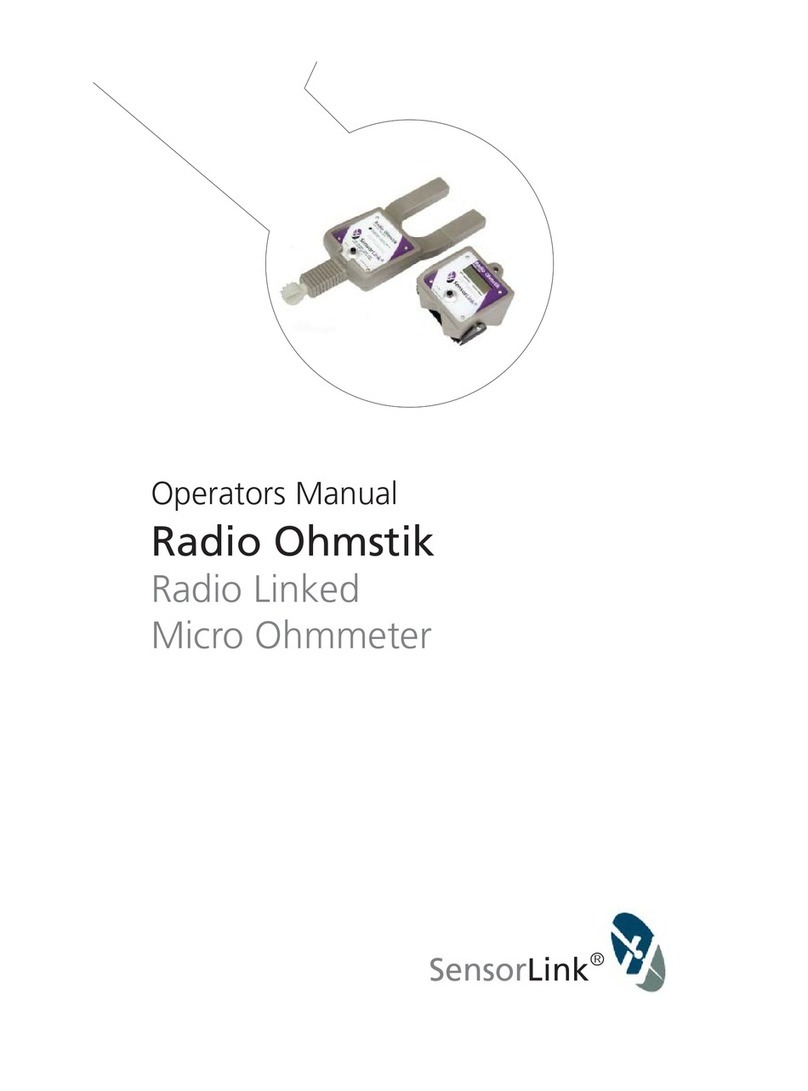
SensorLink
SensorLink 8-182 User manual
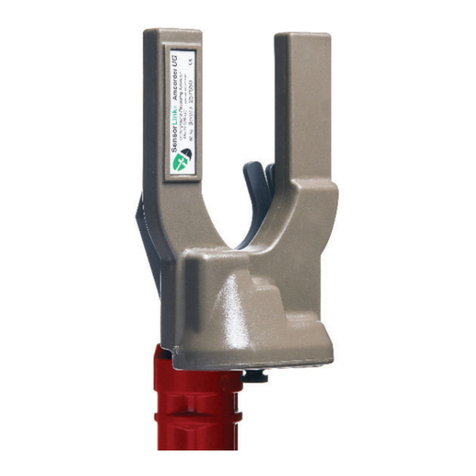
SensorLink
SensorLink Amcorder UG Series User manual
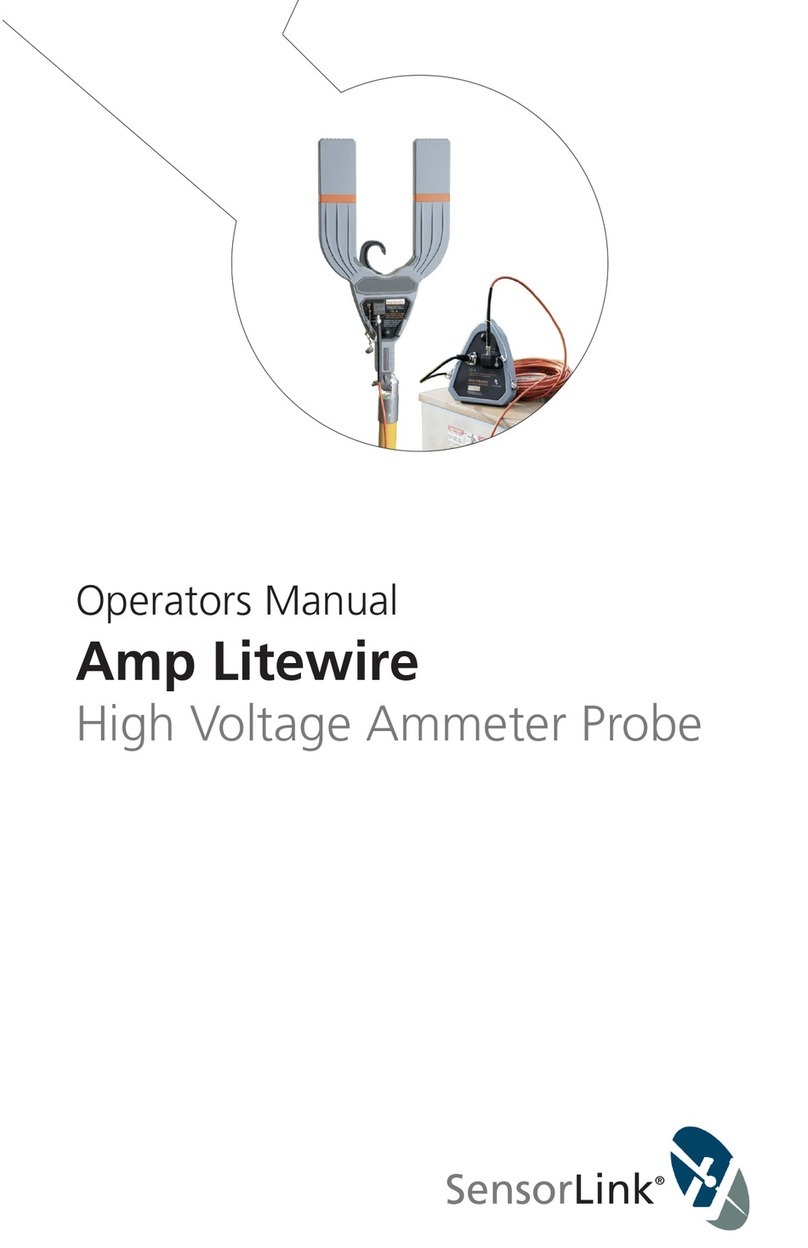
SensorLink
SensorLink 8-117 XT 50HZ User manual
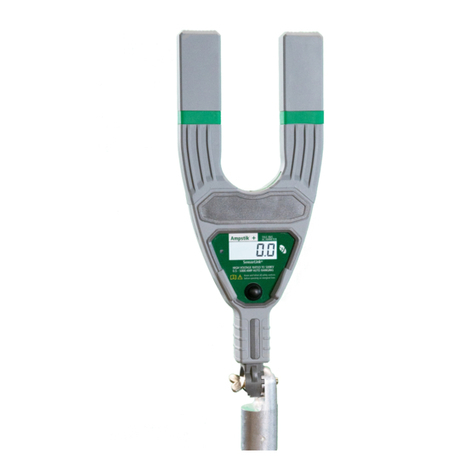
SensorLink
SensorLink Ampstik+ User manual
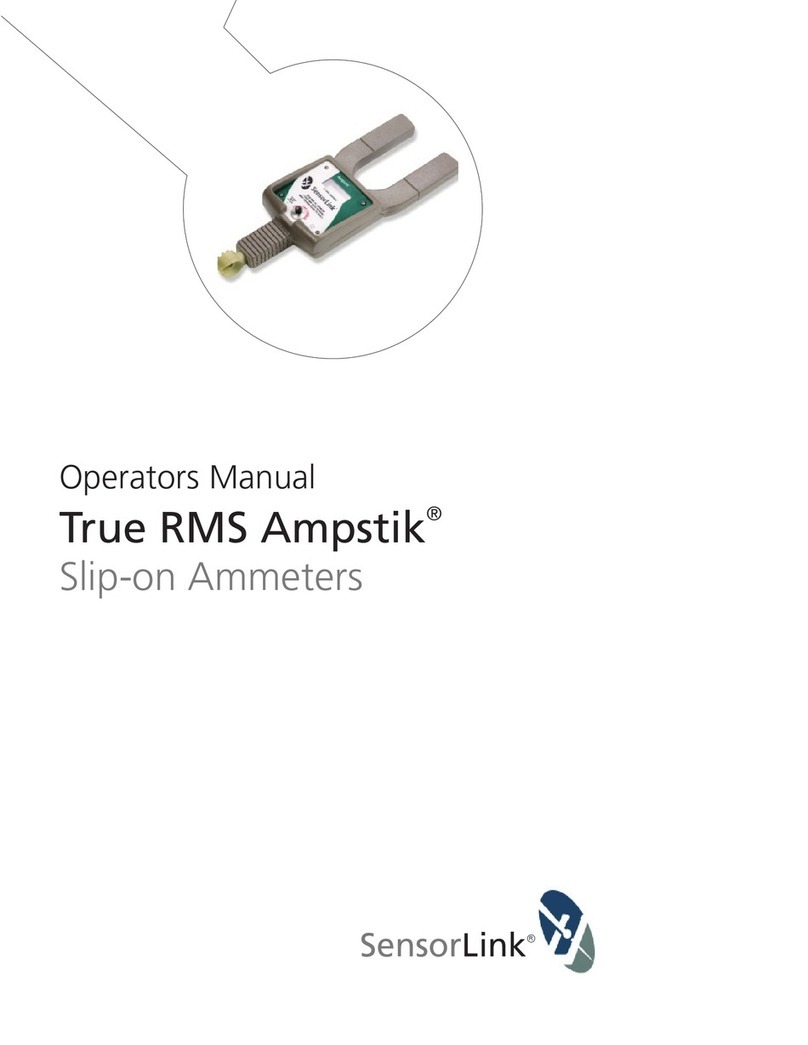
SensorLink
SensorLink True RMS Ampstik 8-020 User manual
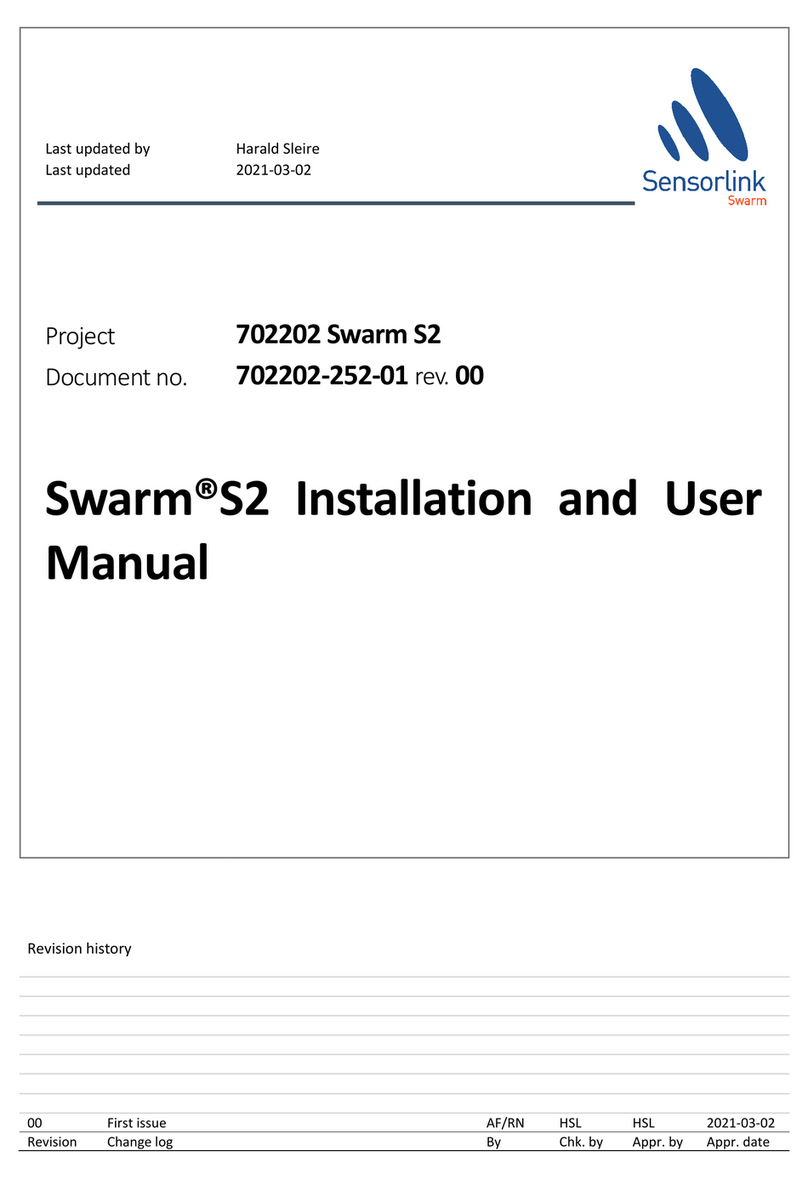
SensorLink
SensorLink Swarm S2 User manual

SensorLink
SensorLink TMS 950 User manual
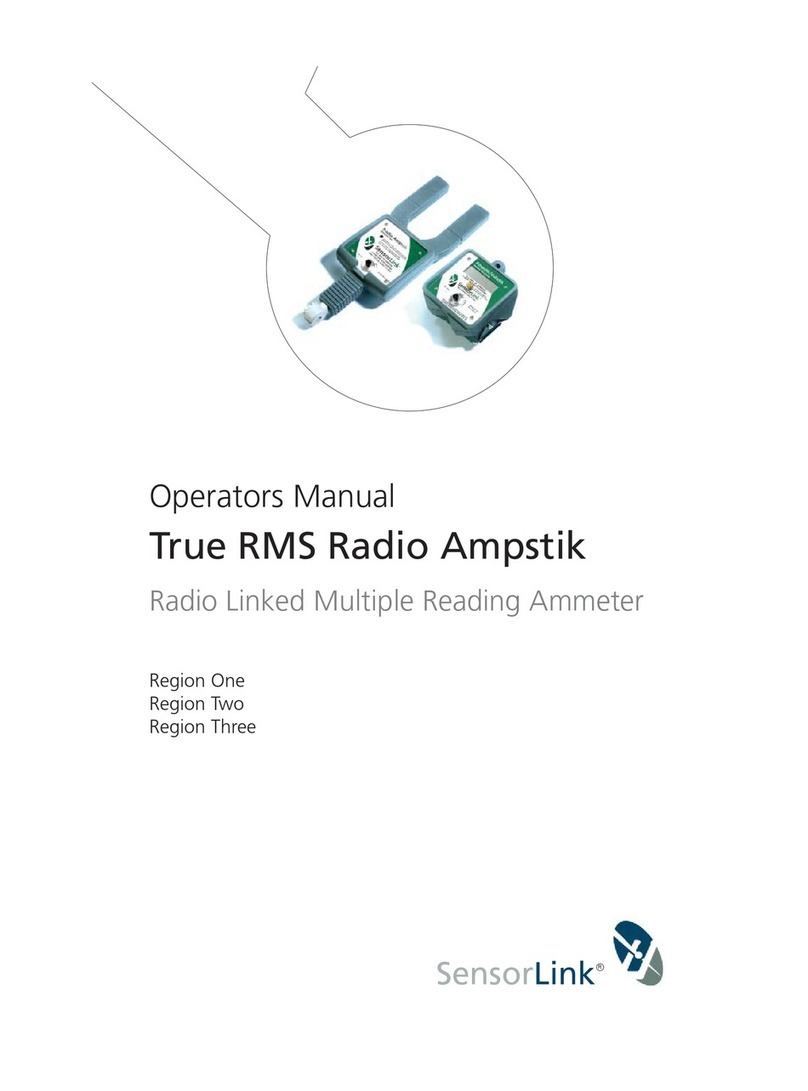
SensorLink
SensorLink 6-120 User manual
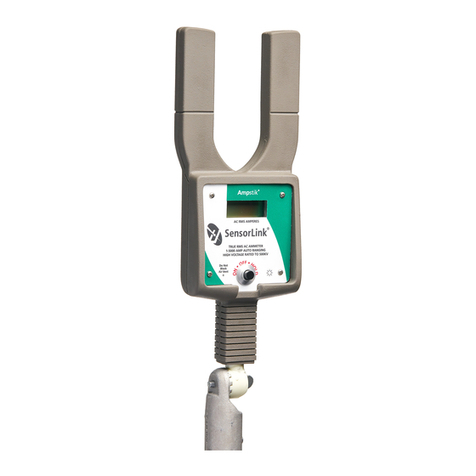
SensorLink
SensorLink Radio Ohmstik User manual
